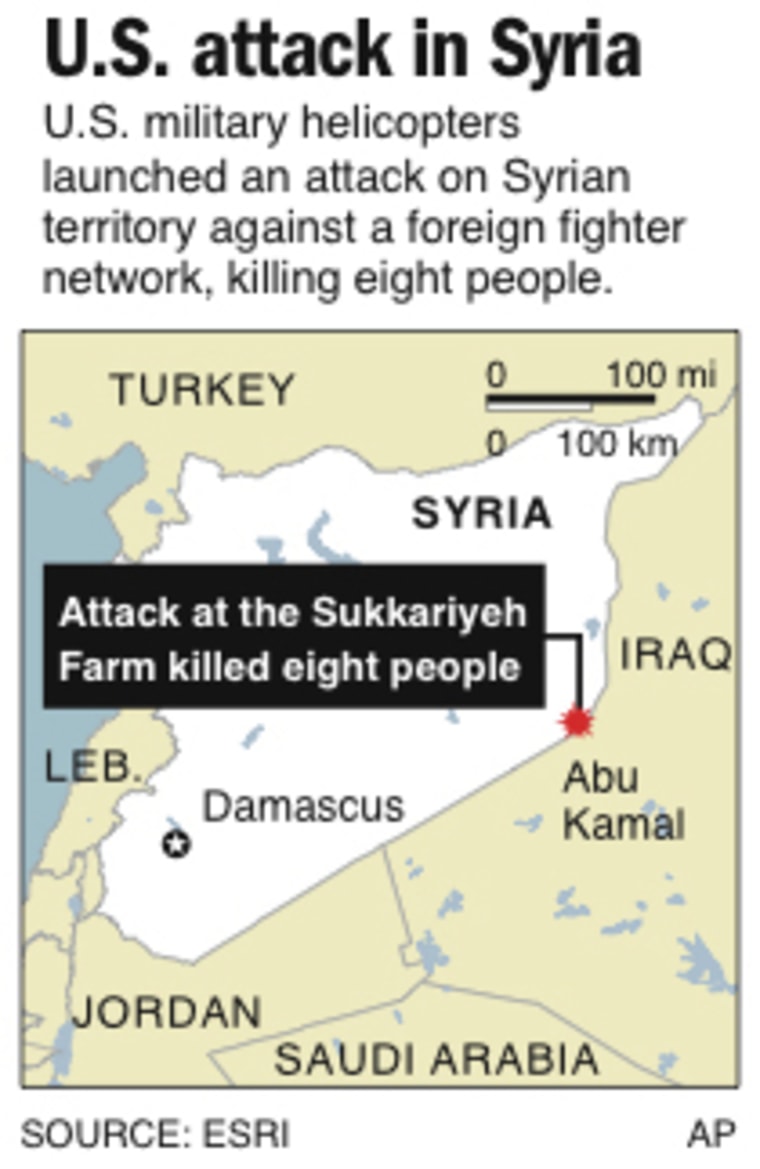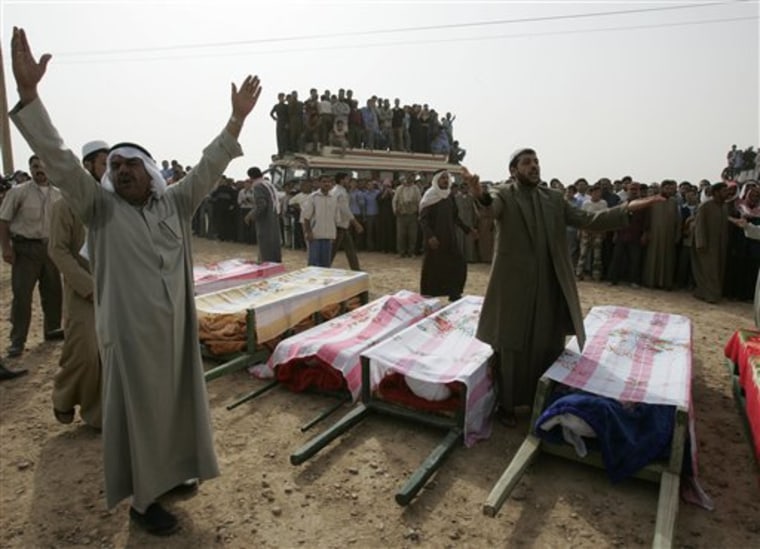As people in this village on Monday buried loved ones they said were killed in a U.S. helicopter attack, U.S. officials told NBC News the raid targeted a Syrian network that funneled fighters, weapons and cash into Iraq.
One U.S. source said the leader of the network was killed, while a resident of Sukkariyeh, who spoke on condition of anonymity because he feared for his life, said he saw at least two men taken into custody by American forces and whisked away by helicopter.
Another villager displayed amateur video footage he took with his mobile phone that shows four helicopters flying toward them as villagers point to the skies in alarm. An Associated Press journalist saw the grainy video Monday.
The startling U.S. commando attack inside Syrian territory appears to amplify an emerging message to countries giving safe passage to terrorists: Take action, or else the U.S. will.
A U.S. military official in Washington said special forces conducted the raid on Sunday to target the network of al-Qaida-linked foreign fighters moving through Syria to help fight in the war in Iraq.
"We are taking matters into our own hands," the U.S. military official in Washington told The Associated Press, speaking on condition of anonymity due to the political sensitivity of cross-border raids.
Target called 'leading facilitator' U.S. officials told NBC News that the main target of the raid was an Iraqi who ran guns and foreign fighters into western Iraq on behalf of al-Qaida.
The officials, who spoke on condition of anonymity, identified the target as Abu Ghadiyah, an Iraqi Sunni in his late 20s.
One U.S. official described him as the "leading facilitator" for al-Qaida in smuggling weapons, foreign fighters and suicide bombers into Iraq through Syria.
Another official said his death would be "significant" in interrupting the flow of illicit arms and foreign fighters into Iraq.
Syria's foreign minister, Walid al-Moallem, described the raid as "cowboy politics," Speaking in London, al-Moallem said of the U.S. raid. He warned that if there was a repeat "we would defend our territories."
Syria said troops in four helicopters attacked a building under construction on a farm and killed eight people, including four children.
But an Associated Press journalist at the funerals in the village's cemetery saw the bodies of seven men — none of them children. The discrepancy could not immediately be explained.
Though the flow of foreign fighters from Syria to Iraq has been declining, Americans have been unable to shut down the network in the area struck because Syria was out of the military's reach.
U.S. frustration with PakistanThe move appears to echo one taken recently in America's other current war. President Bush in July secretly approved U.S. military raids inside anti-terror ally Pakistan, which has been unwilling or unable to stem the flow of militants hiding in Pakistan and waging cross-border raids into Afghanistan.
Helicopter-borne U.S. special forces conducted a raid Sept. 3 inside Pakistan — the only one known so far following Bush's order. Islamabad has complained bitterly about the move, which it says killed some two dozen people, including civilians.

The U.S. has become frustrated with the use of Pakistan's northwestern tribal areas as a safe haven for militants nearly seven years since the Taliban was rousted from Afghanistan for harboring Osama bin Laden.
The raid came just days after the commander of U.S. forces in western Iraq said American troops were redoubling efforts to secure the Syrian border, which he called an "uncontrolled" gateway for fighters entering Iraq.
Syria called the raid, which took place five miles inside its border, a "serious aggression," and its foreign ministry summoned the charges d'affaires of the United States and Iraq in protest.
Government newspapers also published scathing criticisms of the raid in Monday's editions. Tishrin splashed its front pages with a headline denouncing it as a "U.S. war crime," while Al-Baath newspaper described the attack in an editorial as a "stunning, shocking and unprecedented adventure."
Villager says relatives killedIn Sukkariyeh, the Syrian village where the attack took place, families held funerals Monday for those killed. Clergy washed the bodies as angry residents chanted anti-American slogans and carried banners reading: "Down with Bush and the American enemy."
Villager Jumaa Ahmad al-Hamad told The Associated Press he was walking Sunday when he saw four helicopters, two of which landed.
"Shooting then started ringing for more than 10 minutes," al-Hamad said Monday. After the helicopters stopped firing and left the area, he and other villagers went to the site and discovered the bodies of his uncle, Dawoud al-Hamad, and four of his uncle's sons, who he said were killed in the raid.
Iran condemned the attack as did Russia, which has had close ties with Syria since Soviet times.
Iraq 'trying to contain the fallout'
The raid also put the Baghdad government in an awkward position while negotiating a security pact with the United States. Iraqi officials said Monday they hoped the raid would not harm their relations with neighboring Syria, but the government spokesman in Baghdad noted that it happened in an area known as a terrorist haven.
"We are trying to contain the fallout from the incident," Iraqi Foreign Ministry undersecretary Labid Abbawi said. "It is regrettable and we are sorry it happened."
Government spokesman Ali al-Dabbagh, however, said the area where the raid occurred "is a theater of military operations where anti-Iraq terrorist activity takes place."
The attack comes at time when Syria appears to be making some amends with the United States.
Though Syria has long been viewed by the United States as a destabilizing country in the Middle East, in recent months, Damascus has been trying to change its image and end years of global seclusion.
Its president, Bashar Assad, has pursued indirect peace talks with Israel, mediated by Turkey, and says he wants direct talks next year. Syria also has agreed to establish diplomatic ties with Lebanon, a country it used to dominate both politically and militarily, and has worked harder at stemming the flow of militants into Iraq.
It also comes as the flow of foreign fighters into Iraq has been declining. A senior U.S. military intelligence official told the AP in July that it had been cut to an estimated 20 a month. That's a 50 percent decline from six months ago, and just a fifth of the estimated 100 foreign fighters who were infiltrating Iraq a year ago, according to the official.
The area targeted Sunday is near the Iraqi border city of Qaim, which had been a major crossing point for fighters, weapons and money coming into Iraq to fuel the Sunni insurgency.
Ninety percent of the foreign fighters enter through Syria, according to U.S. intelligence. Foreigners are some of the most deadly fighters in Iraq, trained in bomb-making and with small-arms expertise and more likely to be willing suicide bombers than Iraqis.
Syrian Foreign Minister Walid al-Moallem accused the United States earlier this year of not giving his country the equipment needed to prevent foreign fighters from crossing into Iraq. He said Washington feared Syria could use such equipment against Israel.
